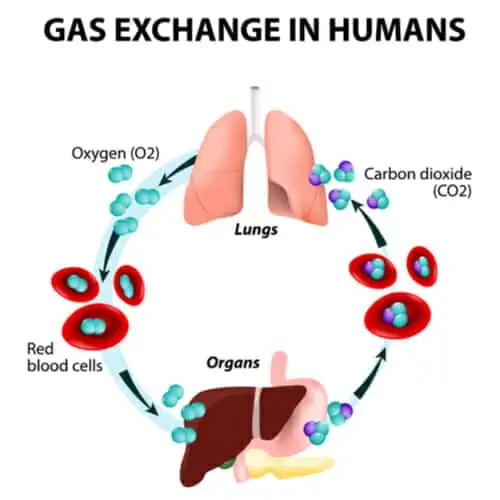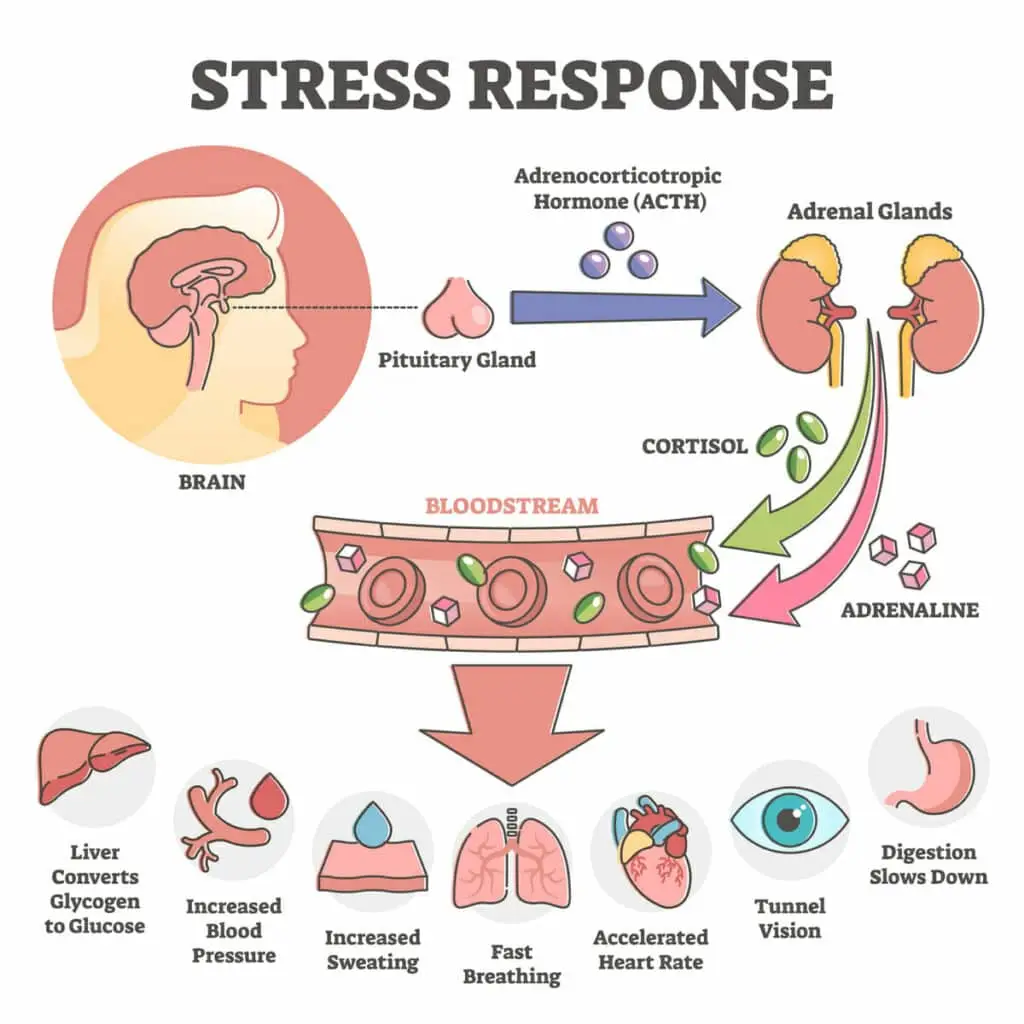Life can be overwhelming, and it’s easy to feel anxious or stressed. With almost 20% of US adults experiencing anxiety daily, finding effective stress-relief techniques is essential. One such technique is deep breathing, which offers numerous benefits for both body and mind.
Deep breathing exercises are an effective and simple solution. Even better, deep breathing benefits your body and mind. Let’s explore how deep breathing could make a long-lasting positive impact on your life.
What are the benefits of deep breathing?
Deep breathing is a simple yet powerful technique that can significantly enhance your mental health. By increasing oxygen intake, deep breathing supports both physical health and mental clarity. Let’s delve into how this practice can positively impact your life.
More oxygen often results in healthier blood and an increased ability to focus. As such, the benefits of long deep breathing tend to be both physical and mental.
To better understand how deep breathing can positively impact your physical and mental health, let’s take a moment and analyze the different deep breathing benefits.
Physical deep breathing benefits
Your body requires quite a few things to stay alive. You need food for cellular energy and repair and shelter to help you regulate your body temperature and remain safe from weather-related dangers.

You also need oxygen. Every breath you take is a sign that your body is refueling and replenishing itself. That’s because the oxygen you breathe in goes straight into the lungs, where it’s processed into the bloodstream.
The circulatory system then carries this fresh supply of oxygen-filled blood throughout the body. The inhaled oxygen then aids in digestion and organ repair. Essentially, without it, you wouldn’t be able to get energy from food.
You also wouldn’t be able to breathe without oxygen. Activities that are dependent on high energy amounts, such as running, would be impossible.
Consequently, there are tons of physical benefits associated with deep breathing. Some of the most crucial of these benefits include:
- Muscle relaxation: Deep breathing helps relax tense muscles, reducing stress and anxiety.
- Blood pressure reduction: Regular practice can lower blood pressure, benefiting cardiovascular health.
- Improved circulation: Enhanced oxygen flow supports overall circulation and cellular repair.
- Mild weight loss: Managing stress through deep breathing can contribute to weight management.
Relaxed muscles
What are the benefits of deep breaths? When your mind isn’t relaxed, neither is your body. The opposite is also true. Having a tensed-up body is a surefire way to induce anxiety and stress.
One of the most wonderful deep breathing benefits might be muscle relaxation. Every breath you take helps bring fresh oxygen to your muscles, and deep breathing can increase musculature relief.
Relaxed muscles might be one of the most obvious benefits of taking deep breaths. You can begin to feel a noticeable difference in muscle tension after only a few minutes of deep breathing exercises.
Reduced blood pressure
As we’ve mentioned, deep breathing benefits the whole body. The biological system that benefits the most from deep breathing might be the circulatory system.
When you’ve been taking shallow and uneven breaths, your heart rate follows suit. Instead of enjoying a slow, consistent heart rate, you might struggle with a rapid and changing pulse.
The faster your heart beats, the more pressure it puts on surrounding arteries and veins. When your heart rate decreases, your blood pressure also often decreases.
Deep breathing exercises could help lower your overall blood pressure, helping to improve your cardiovascular health. Because circulation is vital to survival, improving your circulation is always a fantastic idea.
Improved circulation
Your stress response triggers a wide range of biological reactions. One of the most notable aspects of the stress response is the release of hormones.
When you’re feeling stressed, your body might release a cocktail of chemicals, including adrenaline and cortisol. Though these hormones are helpful in small bursts and amounts, they’re harmful over time.
One of the most worrisome consequences of a prolonged stress response is higher blood pressure. This happens when blood vessels constrict. This pressure can reduce overall circulation.
Because your body relies on the circulatory system for cellular energy and repair, poor circulation can impact everything from digestion to immunity. Deep breathing may help you relax your body, including your blood vessels.
Additionally, learning how to breathe deeply may result in mild weight loss.
Mild weight loss
Did you know that stress is one of the greatest contributors to weight gain? In addition to a sedentary lifestyle, high-stress careers and responsibilities can cause significant damage to your heart and your weight.
One of the primary chemicals your body releases during times of stress is cortisol. While this hormone is beneficial in small, occasional doses, it can become destructive when consistently released over long periods.

Cortisol can cause your body to hold onto fat, causing significant weight gain. While this feature would have been helpful in the ancient past when food was scarce, it’s less helpful today.
When you’re able to let go of stress, you’re also helping yourself avoid excess weight gain. When you practice deep breathing exercises regularly may even experience mild weight loss.
Of course, it’s crucial to pair deep breathing exercises with regular exercise and a wholesome diet. In fact, making a few simple lifestyle changes could heighten both the mental and physical deep breathing benefits.
Mental deep breathing benefits
In addition to a wide range of physical benefits, deep breathing can also improve your emotional and mental state. When you consider how closely the body and mind work together, this concept makes perfect sense.
Some of the most notable mental deep breathing benefits include:
- Anxiety reduction: Deep breathing can help manage anxiety and promote calmness.
- Stress relief: Regular deep breathing reduces stress levels and improves emotional balance.
- Enhanced focus: Increased oxygen levels help sharpen focus and cognitive function.
Anxiety reduction
Anxiety is something that nearly everyone experiences at least once in their life. It’s often described as a feeling of imminent doom and worry, often with little logical support.
And while high-quality online anxiety therapy is a smart solution to life-changing bouts of anxiety, it’s not the only potential treatment option. After all, deep breathing techniques are an excellent coping mechanism.
When you’re unable to schedule time with your therapist, or you notice anxiety symptoms beginning to creep in, you can use deep breathing to keep yourself calm and rational.
The best types of deep breathing exercises for anxiety relief tend to focus on holding longer exhales and inhales. The benefits of deep breathing for anxiety cannot be overstated.
Techniques that require you to use your diaphragm are also beneficial.
Stress relief
Do you know where stress comes from? External stimuli that cause to feel stress are called stressors. But the sensation and feeling of stress come from within.
In the prehistoric past, our ancestors had to survive tumultuous and dangerous conditions. Outrunning hungry predators and escaping environmental hazards were all part of daily survival.
As such, your body develops a keen stress response to help you become faster, braver, and more capable during brief times of incredible stress. This stress response is often called the fight-or-flight response.
Modern dangers aren’t like ancient ones. You cannot outrun an angry employer or punch your way out of heavy traffic.
The chemicals and hormones released during the human stress response have no healthy way to express themselves. Deep breathing, regular exercise, and a healthy diet can relieve stress.
Enhanced focus
Though short bursts of stress can help us focus more clearly, especially on work tasks, prolonged periods of stress can make our brains a little foggy. One of the most notable deep breathing benefits is improved focus.

When you’re taking in more oxygen and reducing your heart rate, you’re allowing your body more time to utilize that oxygen. Generally, more oxygen can reach the brain during deep breathing exercises.
As a result, you may be able to focus more easily and more clearly after deep breathing exercises. The next time you start to feel overwhelmed and scatterbrained, try taking a few deep breaths.
Deep breathing benefits the brain. You may be surprised to find that you’re able to function more effectively after a few minutes of deep breathing.
Of course, you may want to try a few different exercises to find one that works best for you.
Types of deep breathing exercises
There are several deep breathing exercises you can try. While some exercises work best when introduced in a clinical or professional setting, a few are simple enough to do at home.
Naturally, the best breathing exercises for you depend on your preferences and condition. Individuals with asthma or breathing problems should consult with their physician before attempting these exercises.
That said, there are four straightforward breathing patterns that could help you reduce feelings of anxiety and find a sense of inner calm. These four exercises are called:
- Nose-to-mouth breathing: Alternating between inhaling through the nose and exhaling through the mouth.
- Guided mindful breathing: Using mindfulness apps or podcasts to guide your breathing practice.
- Coherent breathing: Inhaling and exhaling for a specific count to promote relaxation.
- Belly breathing: Focusing on deep diaphragmatic breathing to enhance lung capacity.
Let’s take a moment to explore these in greater detail to discover how they work. After all, the first step toward releasing your stress is taking a few deep breaths.
Nose-to-mouth deep breathing
This exercise is all about alternating your breathing pattern. To perform nose-mouth breathing, you’ll want to inhale through your nose and exhale through your mouth.
While you can pace your breathing any way you’d like, it’s best to take long, slow breaths when alternating between the mouth and nostrils. Breathe in through your nostrils, filling your lungs until they’re full.
Then, gently release that air through your mouth until there’s no more air to exhale. If you have nasal or sinus congestion, this exercise could be challenging. In this case, you could try guided breathing exercises.
Guided mindful breathing
There are several mindfulness apps available on smartphones, tablets, and computers. Some of these include mindful, guided breathing exercises.

During a guided mindful breathing session, you’ll listen to a spoken or pre-recorded message. This message may ask you to use your imagination, count your breaths, or pay close attention to your breathing.
Often, the focus of these exercises is to help you relax. Guided breathing is an excellent way to calm down after a stressful or upsetting day. However, the precise breathing techniques used tend to vary.
In addition to using meditation and deep breathing apps, you can listen to an inspirational mindfulness podcast to help you master guided breathing techniques.
Coherent breathing
Coherent breathing (also called resonance breathing) is very similar to nose-mouth deep breathing. During this exercise, you’ll want to inhale through the nose for six seconds.
After that, you’ll need to exhale through the mouth for another six seconds. You’ll repeat these motions for up to ten minutes.
This exercise is beneficial when trying to get some rest. If stressful thoughts or worries keep you awake at night, coherent breathing could help you relax and drift off into a restful slumber more quickly.
Belly breathing
Breathing without using your diaphragm can cause you to miss out on the true benefits of deep breathing. That’s why it’s often crucial to incorporate your stomach muscles into breathing exercises.
To belly breathe, you’ll want to inhale deeply through your nostrils, allowing your stomach to expand. When your lungs are full of air, you can slowly exhale through your mouth. Your stomach should gently deflate.
This type of breathing is a wonderful way to reset your natural breathing tendencies. Most of us never want to stick our gut out, which can lead to shallow breathing. Learning to breathe with your belly is key.

Low self-esteem and body dysmorphia can lead you to ignore your diaphragms. Online counseling sessions could help you work through any mental roadblocks keeping you from breathing deeply.
Experience the deep breathing benefits today
Deep breathing is essential for maintaining both physical and mental health. By incorporating these exercises into your routine, you can enhance relaxation, reduce anxiety, and improve overall health. Interested in personalized support? Contact us today to learn more about online therapy options in Pennsylvania.
Find your Pennsylvania therapist online here.









This Post Has 4 Comments
Try Full Relaxation Breathing or Cardiovascular Breathing
Very nice article really informative
Thank you for this article. It was very useful. I appreciate the research and effort you put into this post. It shows.
Quite extensive and insightful post.
Great info! Thanks!